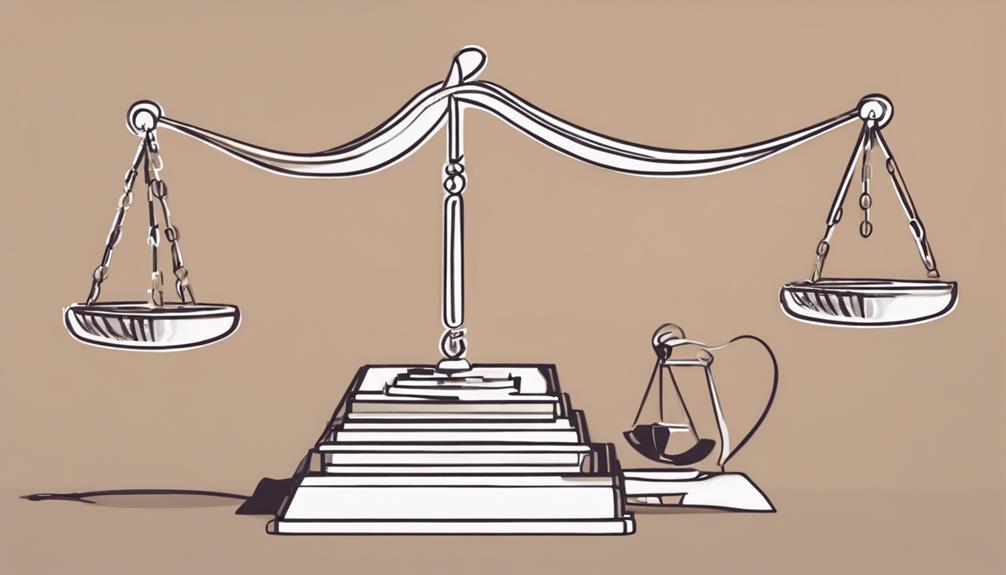When thinking about the complex aspects of a divorce agreement, it is clear why divorce attorneys are paid by the hour. This billing approach goes beyond mere time tracking; it sheds light on the thoroughness of legal processes and the individualized care required for each case.
However, there is more to this billing structure than meets the eye. By exploring the nuances of hourly rates for divorce lawyers, we can uncover a deeper understanding of the legal profession's financial dynamics and the implications for clients seeking legal representation in family law matters.
Key Takeaways
- Hourly rates ensure transparent tracking of legal costs.
- Billing reflects actual time and effort for fairness.
- Lawyer expertise, case complexity, and location influence rates.
- Hourly billing promotes accountability and accurate cost allocation.
Reasons for Hourly Billing in Divorce
Exploring the rationale behind hourly billing in divorce, we find that it offers a transparent and efficient way for lawyers to account for their time spent on each case. When attorneys charge an hourly rate, they accurately reflect the actual time and effort dedicated to a client's divorce proceedings.
This system ensures that clients are only paying for the work done on their behalf, promoting fairness and accountability in legal fees. By breaking down tasks such as legal research, document drafting, court appearances, and client consultations into billable hours, lawyers can provide detailed invoices that clearly outline the services rendered and corresponding charges.
Additionally, hourly rates in divorce cases may vary depending on factors like the complexity of the case, the location of the firm, and the expertise of the attorney involved. This variability allows clients to choose legal representation that aligns with their specific needs and budget constraints, ensuring a tailored approach to their unique situation.
Benefits of Hourly Rates for Lawyers

Hourly rates for lawyers offer a precise and transparent method to track the time dedicated to each client's case, ensuring accuracy in billing and accountability in legal services. This method has several benefits:
- Transparency: Hourly rates provide a clear breakdown of tasks and the time spent on each, giving clients a detailed view of the work done.
- Experience and Expertise: Lawyers can adjust their hourly rates based on their level of experience and expertise, ensuring fair compensation for their skills.
- Cost-Effective: For clients with straightforward cases, hourly billing can be more cost-effective as they only pay for the actual time spent on their matter.
- Accurate Billing: Billing by the hour ensures that clients are charged based on the exact work done, promoting fairness and transparency in legal fees.
Client Perspective on Hourly Billing
Moving from the benefits of hourly rates for lawyers, clients find reassurance in the transparency provided by hourly billing, allowing them to track and understand the precise work undertaken on their case. Hourly rates ensure that clients pay for the specific tasks and the time spent on their legal matters. Detailed monthly invoices provide a clear breakdown of the work done and the associated charges, empowering clients to comprehend the cost breakdown of each aspect of their case. This transparency in hourly billing enables clients to allocate their money wisely throughout the legal process, knowing exactly where their funds are being utilized. By having a detailed account of the time spent and tasks completed, clients can make informed decisions about their legal representation and financial commitments. Below is a table highlighting the key aspects of clients' perspectives on hourly billing:
| Keyword | Description |
|---|---|
| Transparency | Provides clarity and openness in tracking work done. |
| Tracking | Allows clients to monitor the specific tasks and time spent on their case. |
| Detailed Invoices | Offer breakdowns of work completed and charges incurred. |
| Money Allocation | Enables clients to understand where their funds are being utilized in the legal process. |
Factors Influencing Hourly Rates

Considering a divorce lawyer's hourly rates involves various factors that play a crucial role in determining the cost of legal services provided. The following factors can influence the hourly rates charged by divorce lawyers:
- Lawyer's experience and expertise: More experienced lawyers with specialized expertise may command higher hourly rates due to their skill and knowledge in handling complex divorce cases.
- Case complexity: The complexity of a case, such as high asset divorces or contentious child custody battles, can lead to increased hourly rates as they require more time and effort.
- Location: The location of the law firm can impact hourly rates, with lawyers in major cities typically charging more than those in smaller towns.
- Demand and additional services: High demand for a lawyer's services or the provision of additional services during consultations or legal work can also result in higher hourly rates to reflect the value provided.
These factors collectively contribute to the variations in hourly rates charged by divorce lawyers, reflecting the nuances of legal services in the field.
Hourly Billing Vs. Other Fee Structures
When assessing legal fees for divorce cases, various fee structures, including hourly billing, offer transparency and accountability to clients. Unlike flat fees, hourly rates in divorce cases can vary based on the attorney's experience level, with senior partners typically charging higher rates.
Retainer fees, common in hourly billing, require clients to make upfront deposits for legal services, which are then deducted as work is completed. This structure ensures that clients receive detailed monthly invoices that outline the tasks performed, time spent, and corresponding charges, promoting transparency in the billing process.
Hourly billing benefits clients as they only pay for the actual time spent on their case, encouraging cost-effectiveness and holding the legal professionals accountable for the work they perform. By providing a clear breakdown of the services rendered and the time spent on each task, hourly billing offers a comprehensive view of the legal services provided, fostering trust and understanding between lawyers and their clients.
Frequently Asked Questions
Where Do Divorce Lawyers Make the Most Money?
In major cities and affluent areas, divorce lawyers can command higher hourly rates due to demand, specialized expertise, and complex cases. Factors like reputation, experience, and clientele influence their earnings, with some earning more than others.
Why Do Lawyers Have a High Divorce Rate?
Facing high divorce rates, lawyers navigate demanding work environments and personal life strains. Stress, long hours, and emotional tolls contribute to the challenge. Balancing commitments proves tough, impacting our marital stability significantly.
How Much Is a Divorce Attorney in Tx?
In Texas, divorce attorneys' rates vary based on experience, location, and case complexity. Hourly rates average around $300. Retainers upfront range from $2,500 to $15,000, placed in escrow accounts, refundable if unused. Detailed bills provided.
Can My Spouse Make Me Pay Her Divorce Attorney Fees in Texas?
Yes, in Texas, one spouse can be ordered to pay the other's attorney fees based on factors like income difference. The court considers financial need, ability to pay, and reasonableness of fees in deciding reimbursement.
Conclusion
In conclusion, hourly rates for divorce lawyers offer transparency, fairness, and flexibility for both clients and lawyers.
By tracking time spent on each task, clients can see the value they're receiving.
While factors like experience and complexity can affect rates, the hourly billing structure ensures that clients are only paying for the actual work done.
Overall, hourly rates may seem like they make time stand still, but they actually make the legal process more efficient and cost-effective.










